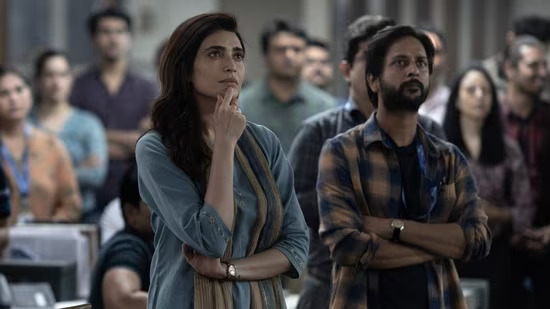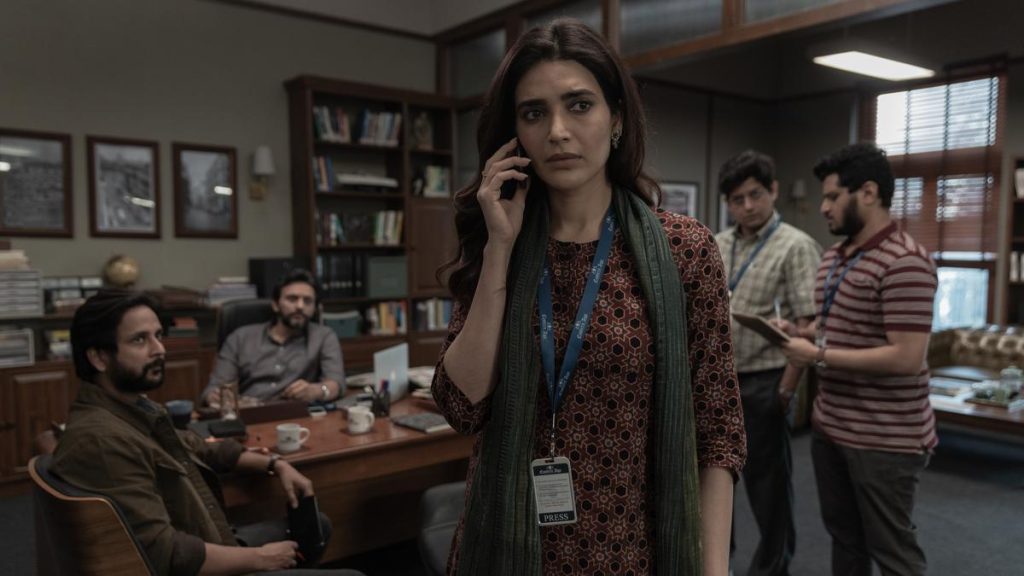
Scoop review: Hansal Mehta’s subversive take shines light on journalism’s dark side

‘Like it or not, she is a strong woman, and a strong woman is always considered a threat.’ It’s a line that resonates very deeply — the working world isn’t kind to women, and certainly not to women who dare to outshine their male counterparts.
Hansal Mehta’s Scoop, based on the true story of Jigna Vora, documented in her book Behind Bars in Byculla: My Days in Prison (2019), depicts this inherent bigotry in our grammar alongside the sprawling world of Indian journalism that remains at the centre of a nexus of crime, politics, and the legislation.
Whens Jagruti Pathak (Karishma Tanna) hustles through the world of crime reportage delivering one exclusive after another, her envious male colleagues are quick to attribute her success to sleeping with the boss, the editor-in-chief of Eastern Age (based on Hussain Zaidi, the resident editor at The Asian Age then), and Imran Siddiqui (Mohammed Zeeshan Ayyub), with whom she is shares a platonic friendship.
Also read: Asur Season 2 review: Mythology meets technology in a thrilling, but unfulfilling fare
When high-ranking officers from Mumbai police, in particular JCP Shroff (Harman Baweja), confirm her stories easily, it is said that she favours him in ways that men can’t. The officer himself hints towards getting something in return for all the help he provides to her.
A collateral damage
The world around Pathak reeks of sexism and patriarchy, but her ambition implores her to stride through this male-dominated industry, where newsrooms are constructed in a manner that isolates her because of her gender. But she pushes through nevertheless, and emerges as an unequivocal force to reckon with, going from page six to page one just within seven years.
Then calamity strikes — a senior colleague, Jaideep Sen (Prosenjit Chatterjee, modelled on crime reporter J. Dey), is murdered and Pathak is arrested, for provoking and sharing personal details of Sen with the underworld don Chhota Rajan.
Soon, both primetime television and print media begin churning her story for entertainment, attacking one of their own, while appropriating the death of another. The grave injustice faced by two journalists is packaged as amusement, shared under the guise of news and presented to a controversy-hungry nation as facts filled with fiction.
Pathak is subjected to character assassination, and put under a vulturous media trial — she is called Rajan’s girlfriend, questioned for being protected by JCP Shroff (the very man who has been framing her along with the rest of the Mumbai Police), and humiliated for her intimacy with Imran.
Also read: Bheed review: Anubhav Sinha’s sombre portrait of migrant exodus during lockdown
Neither the police nor the press is interested in finding out the truth — the very truth that Sen died discovering, that led top officers to find a scapegoat in Pathak. Theories and controversies are what everyone cares about, unperturbed about the consequences, including Pathak who, in her chase of exclusives, forgets about collateral damage, up until she is collateral damage herself.
A convoluted tribute to the pen
Written by Mrunmayee Lagoo Waikul and Mirat Trivedi, and created by Mehta and Lagoo, Scoop is subversive in the way it captures journalism on celluloid. There is not much material out there that has portrayed journalists the way Hansal Mehta has — his past work, Aligarh (2016), and Scam 1992: The Harshad Mehta Story (2020) also had journalists driving the narrative forward, but in Scoop, journalists are the story, front and centre in the narrative, and Mehta makes it a point to give them a fitting representation, without falling prey to the tropes that Hindi cinema has often attributed to journalists.
“I may not have murdered Sen, but I certainly have a hand in the murder of journalism,” says guilt and grief-stricken Jagruti to a fellow inmate while wallowing in the Byculla jail. “We’ve started treating our readers like consumers,” comments Imran at the sorry state of the fourth pillar of democracy.
Scoop pays a convoluted tribute to the pen that wields the power to tell the truth of a country, but is left stirring a pot of stories garnished with a few facts here or there. It reminds us how we’ve begun selling stories, instead of telling them — Mehta implores us to recognise this difference.

Between Scam and Scoop, Mehta once again establishes that he has a knack for telling stories based on truth, this time in the web-series format. He has a gift when it comes to storytelling, and most of his works are a testament to that, but what sets him apart is his quest to tell a larger story in the backdrop of the one he is telling.
He is always trying to make a point — not a single frame is there just to move the story forward, it is there because it needs to be there, because he is trying to tell you something, if you’re willing to listen. Honestly, it is painful for an entertainment journalist, because given the tight grip Mehta commands on filmmaking, there is no space to doze off, or fast-forward. You must watch it all, and you watch it well, because you blink and you miss.
A black and white lens
However, despite Mehta’s best efforts, Scoop doesn’t become a Scam, even though it’s quite close to it. The distance between the two is Karishma Tanna — who is as much Jagruti Pathak as Pratik Gandhi is Harshad Mehta, but she is no Pratik Gandhi. It isn’t that Tanna isn’t impeccable, it’s just that Gandhi is simply too effortless, and comparisons seem inevitable.
Also read: Afwaah review: Sudhir Mishra’s warning against fake news is unsubtle but urgent
It is Mohammed Zeeshan Ayyub who comes out shining from this show — he is spectacular. When he says, “When someone says that it’s raining, and another says it’s dry, it’s not your job to quote them both. Your job is to look out of the window, find out which is true,” you are reminded of what you must do, as a journalist, as a reader and as a citizen. There is earnestness to his performance that perhaps comes from his own belief as a person who remains strongly vocal in a crowd of cowards.
The casting of Harman Baweja is as interesting as successful, after his apparent comeback from an unofficial hiatus. Ira Dubey as wife of Pushkar (Tanmay Dhanania) has a brief role, but nonetheless a powerful one. There’s a scene where Pushkar and his chauvinist friends are discussing Pathak and how she ‘gets’ her Page One, when his wife (Dubey) walks in disgruntled, about facing similar problems in her corporate career where she is accused of sleeping with her boss because she got a promotion.
Scoop rises above binaries and looks at things from a black and white lens — it doesn’t run away from the complex nature of both the job and life at large. It understands that sometimes lines do get crossed, and that doesn’t make one bad, but it certainly makes us a culprit in this rat race that has left the fourth estate in a shambles.
It reminds us that simply doing our job isn’t enough, if it means doing it at the cost of compassion and sensitivity. And alas, in prophetic dialogue by a self-serving intern Deepa (Inayat Sood), “who reads newspapers to become responsible citizens? Kids make airplanes out of it, and elders use it to wrap snacks. It’s entertainment, at least TV gets that.”


